


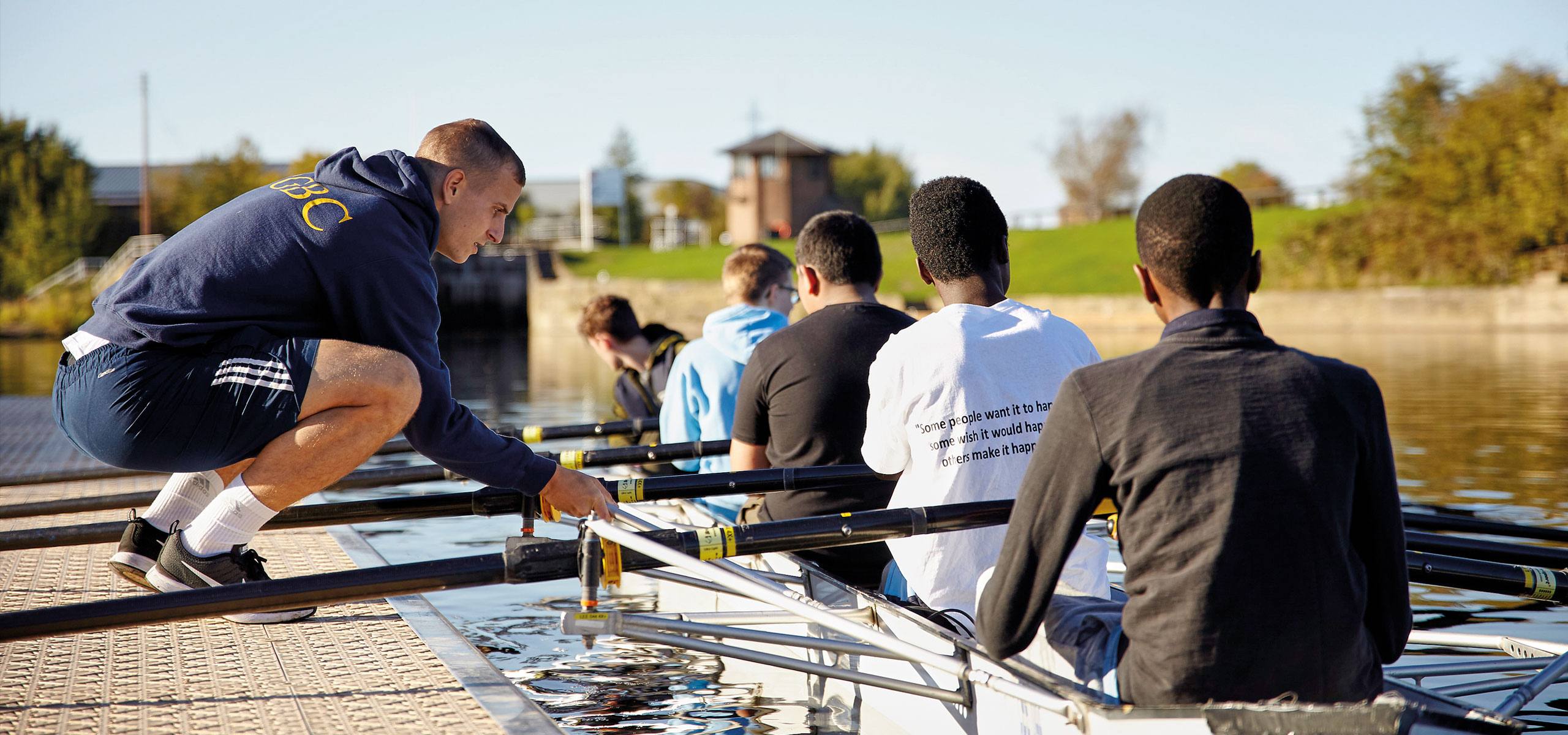
When it comes to talent, background doesn’t matter. The University is finding creative solutions to make sure the city’s young people fulfil their potential.
Sheena Hastings talks to those involved.
Every year, thousands of talented young people who would do well at university do not even apply.
Barriers can include family experience and income, lack of confidence and perhaps a school where there is a low level of progression to university.
The stark fact is that children from underprivileged families are up to six times less likely to go to university than someone from a privileged background – and likely to earn £100,000 less in their working lives. While 61 per cent of young people from advantaged backgrounds get two or more A-levels, only 36 per cent of those from disadvantaged backgrounds do. In some areas this figure drops to 20 per cent.
There are ways this can be addressed, though. Access to quality school or college provision and good careers advice has an impact, as does outreach from universities and work to help young people prepare for the transition to the next, ‘post-18’ stage of their lives.
“This is where Leeds comes in,” says Louise Banahene, the University’s Head of Educational Engagement. “We have a track record of ensuring the brightest and best, whatever their background, can benefit from the mind-expanding experience of higher education. We really know it’s something that will increase life chances and happiness and affect the aspirations of future generations.”
The University’s outreach programme reaches thousands of young people, their parents and teachers, through programmes like IntoUniversity for schoolchildren aged 7–19. It is also partnering with organisations – like RowUK, run by a Leeds graduate – to find other creative ways to engage young people.
Leeds’ two-year Reach for Excellence programme – supported by the Liz and Terry Bramall Foundation – helps students secure a place at a research-intensive university. With academic taster sessions, study skills support and a residential summer school, hundreds of students have benefited during the 11 years it has been running.
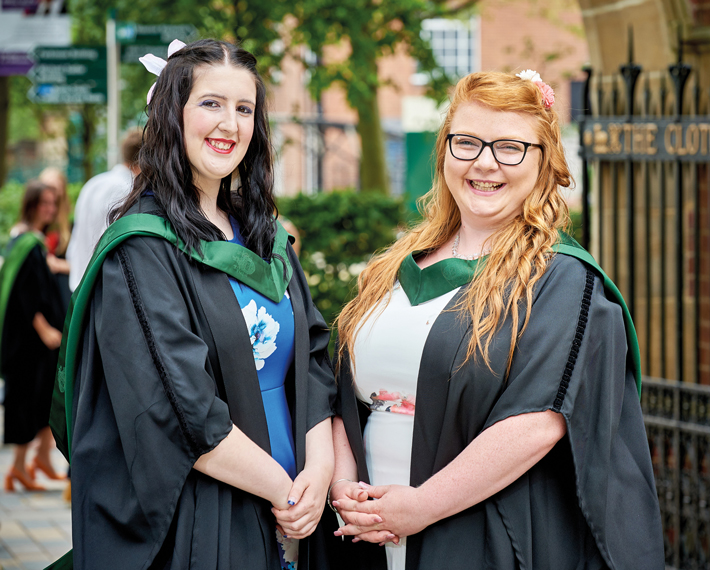
However, the work does not end with applying to university. The Access to Leeds programme guarantees special consideration for applicants whose personal circumstances have affected their ability to demonstrate their talent and potential through grades alone. “It’s the largest contextual admissions scheme in the country, with over a thousand entrants a year, and we’re really proud of the impact it has had,” says Louise.
Eligible students are made an alternative offer subject to their participation in a study skills module, as well as completion of a short assignment relating to the course they want to study. “We ask for up to two grades below the standard for their course,” says Louise. “But many outperform the offer as a result of that additional support.”
Left: Dressed for success: Molly Rumford (Theatre & Performance 2018), left, and Katie Mahon (Theatre and Performance (Industrial) 2018).
Both shared an Enterprise Scholarship at Leeds, and Katie received a Bramall Scholarship. After Leeds they founded Bloomin’ Buds Theatre Company which they describe as “challenging the stigma of the class divide through community based theatre.”
Scholarships of up to £3,000 a year – funded by Leeds alumni and other donors – are also important ways to remove a barrier for many disadvantaged applicants. And once at Leeds, this group perform as well academically as anyone else.
A key part of support at Leeds is the Plus Programme that provides help with transition, academic success and progression to a job or further study. “It’s vital also that these students develop the confidence to go after the same jobs as people from more privileged backgrounds,” says Louise.
It has been argued that tackling inequality should not be a university’s problem, and contributing issues such as low academic attainment and lack of aspiration should be addressed by schools.
However, it’s clear that collaboration is vital in addressing social mobility at all levels. Leeds works closely with the city and other ‘anchor institutions’ as well as education providers, charities and community organisations to implement a collective and coherent approach.
“Diversity and the range of experiences and skills it brings with it can only enhance the University, our communities and our professions,” says Louise. “That’s why we are committed to closing the gaps in access, student success and progression. And of course, we couldn’t do this without the partnership and support we receive – including from our alumni community.”
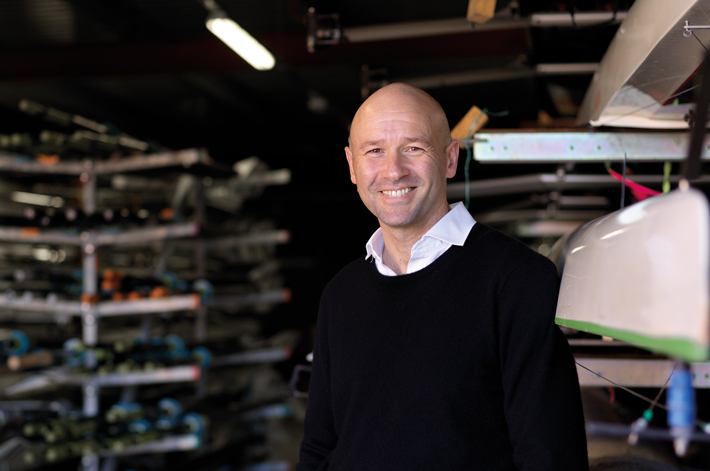
Teacher and rower Ben Cox (English Language and Literature 2002) conceived RowUK following his success in teaching more than 1,000 young people in some of London’s most disadvantaged areas to row. Many applied their new-found confidence to improving academic grades and considering higher education.
Now working with underprivileged schoolchildren in south Leeds, RowLeeds programmes have introduced the discipline and resilience of competitive sport into many more young lives.
Twenty Leeds schools take part in RowLeeds indoor rowing programmes, with the keenest, most consistent rowers progressing onto the water with Leeds Rowing Club. In 2017, 2,296 young people were introduced to rowing, competing with other schools in the city and Yorkshire. RowUK also rewards commitment and persistence, encouraging participants to aim for regular milestones and a target of a million metres. The University’s Schools of Psychiatry, Biological Sciences and Food Science and Nutrition are now working with RowUK on research into how rowing and other exercise has an impact on school attendance, academic attainment, admission to university, employability, and wellbeing.
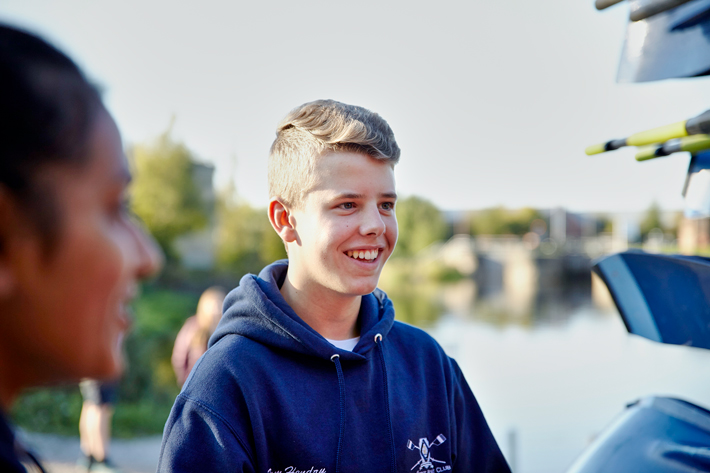

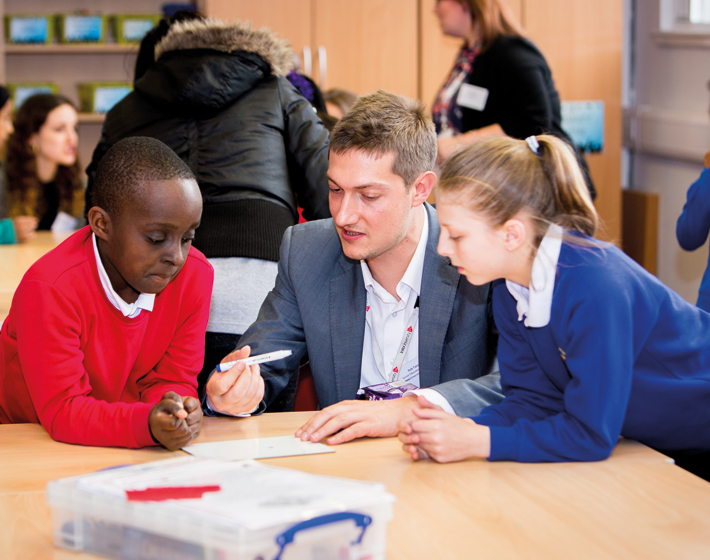
The charity IU started in 2002 as a homework club for disadvantaged children in North Kensington. There are now 27 centres nationwide, each with a leader, team of education workers, volunteers and interns.
Staff run workshops in primary and secondary schools, give after-school academic support, run activities aimed at raising academic attainment, attitude to learning, confidence and aspirations. Students get a taste of university through campus visits and classes. Working in partnership with the University of Leeds and the Queen’s Trust, IU opened a centre in Leeds East in 2014 and Leeds South in 2015.
In 2016/17, the Leeds centres supported 3,225 young people, with a total of 5,616 since 2014. Last year the progression to university rate for Year 13 students involved with IU in Leeds was 70 per cent, while nationally only 22 per cent of disadvantaged students progressed to higher education.
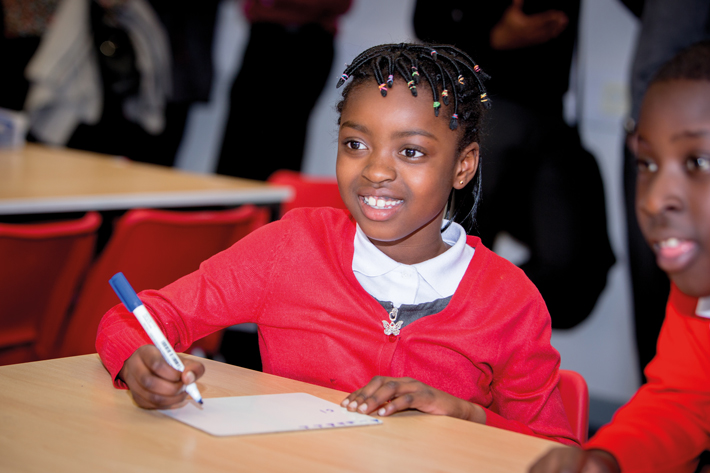
This is what future graduates look like.
Leeds pupils at the IntoUniversity Centre.
Seventy per cent of IU students progressed to university in 2017, compared with 22 per cent of disadvantaged students nationally.
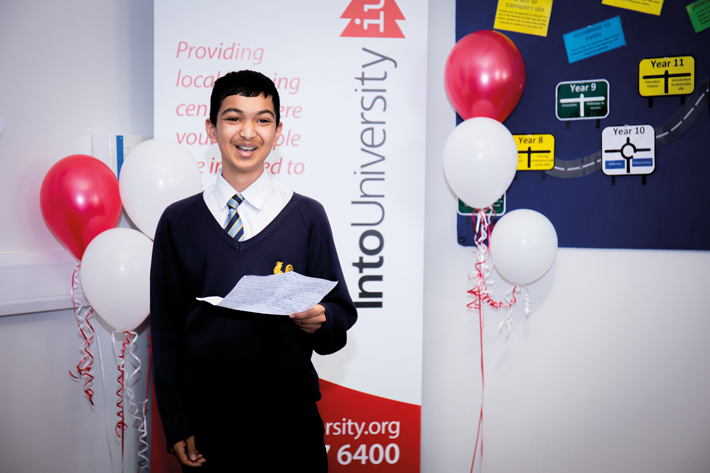
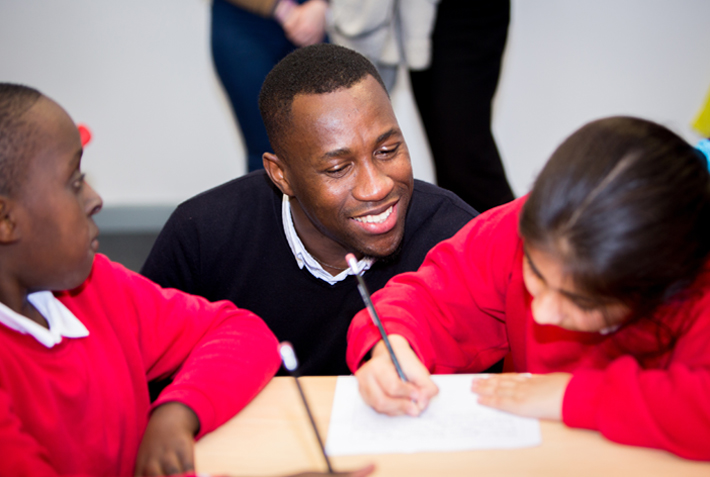
Frehiwet, 15, has attended IntoUniversity in east Leeds since she came to the UK from Ethiopia. After 400 hours of support from IntoUniversity, plus university residentials and mentoring, she intends to apply to study nursing.
Mehreen, 19, is a second year Law student at Leeds. “I didn’t know what I wanted to do at university, but IntoUniversity provided regular mentoring to help with my UCAS application. Last year I went back to IU and helped a Year 8 with homework. I am from a low-income family, and the University has given me a scholarship to help throughout my course.”
Abigail, 18, is a first year Physical Activity, Exercise and Health at Leeds Beckett University. “The discipline of rowing 4–5 times a week with RowUK has totally affected the way I live my life, allowing me to develop skills that aided me with my studies, and showed me that I can do anything I put my mind to.”